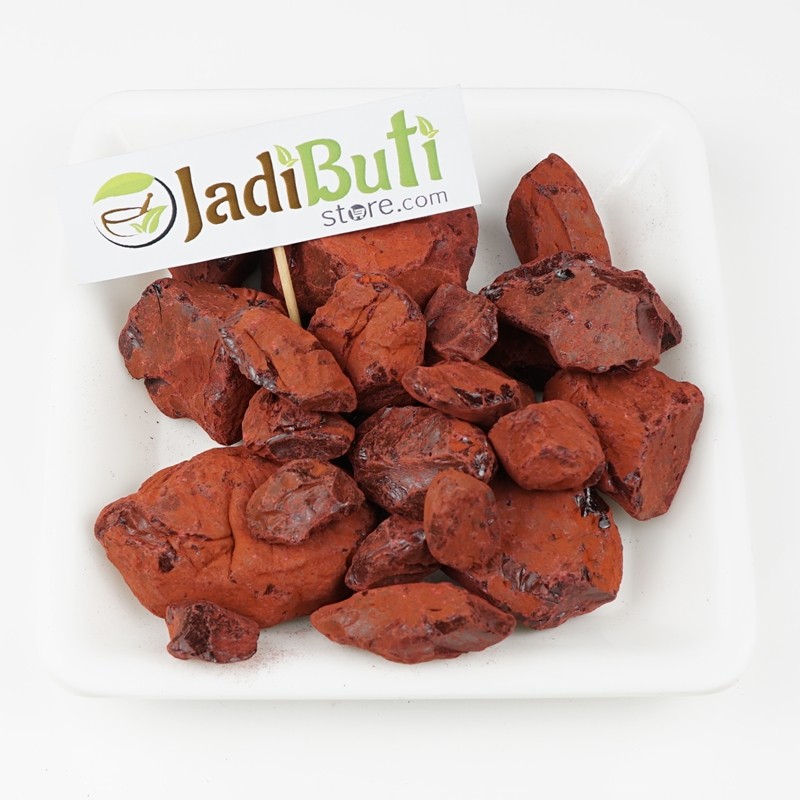J
Showing all 11 results
-


Jaiphal – जायफल – Nutmeg – Myristica fragrans
₹450.00 – ₹3,145.00Quick ViewJaiphal – जैफल – Nutmeg – Myristica fragrans.
Jaiphal in In Different Languages:
Jaiphal in English Name : Nutmeg & Mace
Jaiphal in Hindi Name : Jaiphal & Jawitri
Jaiphal in Latin name : Myristica fragrans Houtt.
Jaiphal in Urdu Name : Jaiphal & Jawitri
Jaiphal in Arabic Name : Jawz Bawwaa & Bisbasa
Jaiphal in Bengali Name : Jaiphal & Jaitri
Jaiphal in French Name : Muscadier & Macis
Jaiphal in German Name : Muskatnussbaum & Muskatblüte
Jaiphal in Gujarati Name : Jaiphal & Jawitri
Jaiphal in Kannada Name : Jajikai & Jaipatri
Jaiphal in Kashmiri Name : Jafal
Jaiphal in Marathi Name : Jaiphal & Jawitri
Jaiphal in Persian Name : Gauzbua & Bazbaaz
Jaiphal in Punjabi Name : Jaiphal & Jawitri
Jaiphal in Sanskrit Name : Jatiphalam & Jatipatri
- “Nutmeg is a spice derived from the seed of the nutmeg tree (Myristica fragrans), and is commonly used in cooking and baking.”
- “Nutmeg is a rich source of essential oils, including monoterpenes, sesquiterpenes, and terpenoids, which give it a warm, sweet, and slightly bitter flavor.”
- “The spice is known to have anti-inflammatory and analgesic properties, making it useful for treating pain, swelling, and discomfort.”
- “Nutmeg has been used traditionally as a natural remedy for digestive problems, such as nausea, bloating, and indigestion.”
- “Studies have shown that nutmeg has the potential to boost cognitive function, as it is believed to enhance memory and concentration.”
- “Nutmeg has been used as a natural remedy for insomnia and other sleep-related disorders, as it has a calming effect on the body and mind.”
- “The essential oils found in nutmeg have antifungal and antibacterial properties, making it useful for treating various skin infections and conditions.”
- “Nutmeg is also known to possess anti-tumor properties, and has been used as a natural remedy for certain types of cancer.”
- “Nutmeg is rich in antioxidants, which help to protect the body against oxidative stress and damage caused by free radicals.”
-
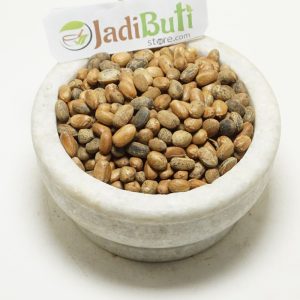
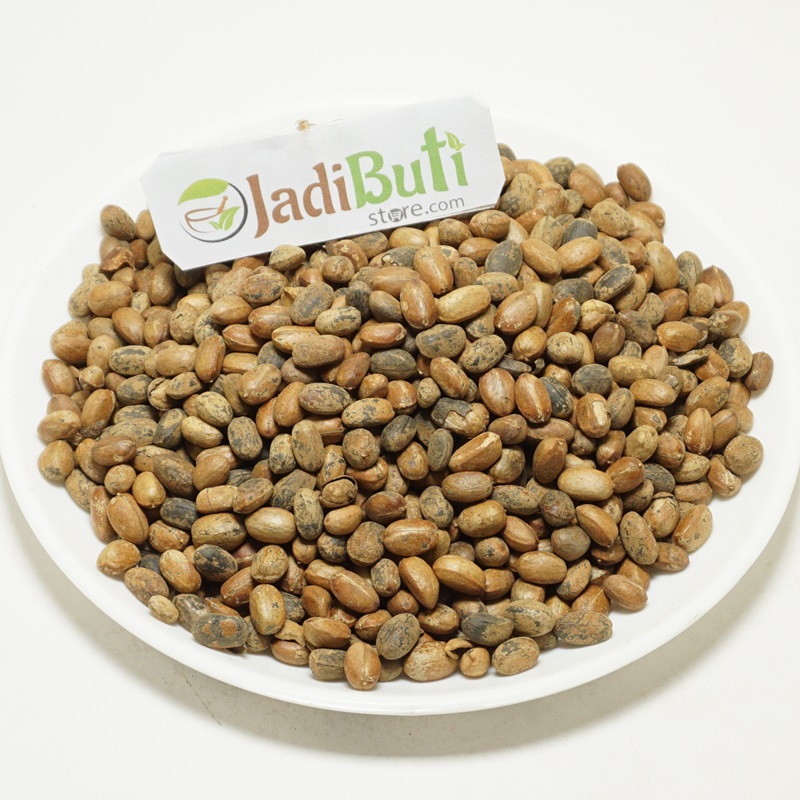
Jamalgota – जमालघोटा – Purging Croton – Croton Tiglium
₹320.00 – ₹1,130.00Quick ViewJamal ghota – जमालघोटा – Purging Croton – Croton Tiglium.
Name in different languages:
Sanskrit Jaipal. Hindi Jamagalpa English Paragraphic Croton flag Jamagalpa Gujarati Nepalese Bengali Jaipal. Latin Croton tiglium. In India, Jamalgota is grown in the gardens of Punjab, Assam, Bengal and South India, they grow automatically too. It is originally born in China. Jamal Gota trees are taller than 4.5 m to 6 m, like evergreen trees. Its leaves range from 2 to 4 inches long and thin, notched, smooth with 3 to 5 veins, which become light yellow on drying. Its flowers are small and white in the flowers. The fruits of Jamal Gota are divided into three parts, rectangular, about one inch in length of white color. Seeds are about half an inch long, elliptical, almond brown, easy to remove the cover. Jamal Gota yields three seeds. Flowers bloom in the month of summer and the fruits take place in the winter months.
-
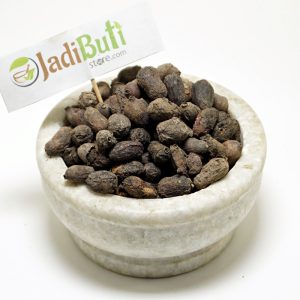

Jamun Guthali – जामुन घुटली – Eugenia Jambolana – syzygium cumini
₹165.00 – ₹680.00Quick ViewJamun Guthali – जामुन घुटली – Eugenia Jambolana – syzygium cumini
Jamun Guthli In different Language
Jamun Guthli in English name – Eugenia Jambolana Seeds
Jamun Guthli in Hindi name – Jamun Guthali
Jamun Guthli in Latin name – syzygium cumini
- Hindi: Jamun, Jambul
- Bengali: Jam
- Marathi: Jambhool
- Tamil: Neredu
- Telugu: Neredu
- Kannada: Neredu
- Malayalam: Njaval
- Indonesian: Jambu air
- Thai: Ma-praang
- Chinese: Hong-zao
Jamun Guthali is helpful for diabetic patients. Since Jamun seed posses antioxidant property so, this Jamun Guthli powder protects pancreatic beta cells from oxidative stress. Chemically Jamun seeds contain quercetin, gallic acid, and ellagic acid which are known antioxidants.
Key Benefits:
- Jamun relieves stomach pain and is a carminative
- Anti-scorbutic and diuretic
- Beneficial in reducing enlargement of spleen
- Treats diarrhoea
- Helpful in urine retention problems
Directions For Use:
As directed by the physicianSafety Information:
- Store in a cool, dry place, away from direct heat and sunlight
-

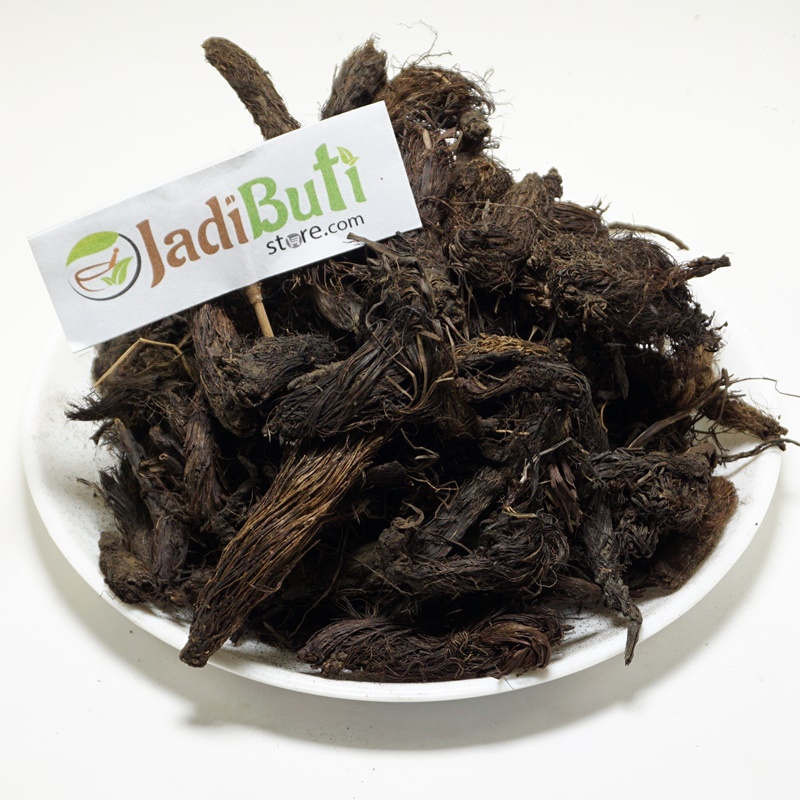
Jatamasi – जटामासी – Musk Root – Nardostachys
₹110.00 – ₹830.00Quick ViewJatamasi – जटामासी – Musk Root – Nardostachys.
Jatamasi English Name : Musk Root, Indian Spikenard
Jatamasi Hindi Name : Balcharr, Charr, Jatamashi
Jatamasi Latin name : Nardostachys
Jatamasi Urdu Name : Balcharr, Sumbul-ut-teeb
Jatamasi Sanskrit Name : Jatamansi, Mansi, Jata, Jatila
Jatamasi Arabic Name : Sunbul, Sunbul al-teeb, Sunbul Hindee, Sunbul al-’asaafeer, Nardeen
Jatamasi Bengali Name : Jatamamsi
Jatamasi Chinese Name : Gan song
Jatamasi French Name : Nard Indien
Jatamasi German Name : Achte Narde, Moschuswurzel, Sumbulwurzel
Jatamasi Gujarati Name : Baalchad, Kalichad, Jatamasi
Jatamasi Kannada Name : Bhootajata, Ganagila maste
Jatamasi Kashmiri Name : Bhut-jaat, Bhutijatt
Jatamasi Marathi Name : Jatamansi
Jatamasi Persian Name : Sumbul Hindi, Narde Hindi, Reshahwala
Jatamasi Punjabi Name : Balchhar, Chharguddi
-


Jatamasi (Medicinal) – जटामासी – Musk Root – Nardostachys
₹460.00 – ₹3,550.00Quick ViewJatamansi is used to treat a variety of conditions, including anxiety, depression, insomnia, and digestive issues. It is also used as a natural remedy for headaches, skin problems, and menstrual disorders.
Ayurvedic Property Description Rasa (Taste) Bitter, sweet, astringent Guna (Quality) Heavy, oily Virya (Potency) Cooling Vipaka (Post-digestive effect) Sweet Dosha effect Balances Pitta and Kapha doshas; may aggravate Vata dosha in excess Dhatu (Tissue) Nervous tissue (Majja dhatu), plasma (Rasa dhatu) Srotas (Channels) Nervous system, digestive system, respiratory system Karma (Actions) Calming, grounding, sedative, anti-inflammatory, digestive stimulant, nervine, cardiac tonic Active Compound Potential Benefits Valerianic acid Sedative, anxiolytic, anti-inflammatory Jatamansone Sedative, anxiolytic, anticonvulsant, neuroprotective Nardosinone Anti-inflammatory, antioxidant, hepatoprotective Nardostachone Sedative, anxiolytic, anticonvulsant, neuroprotective B-Asarone Sedative, anxiolytic, anti-inflammatory, hepatoprotective Calarene Anticonvulsant, neuroprotective -
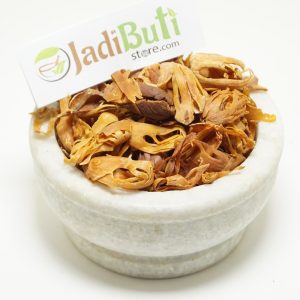
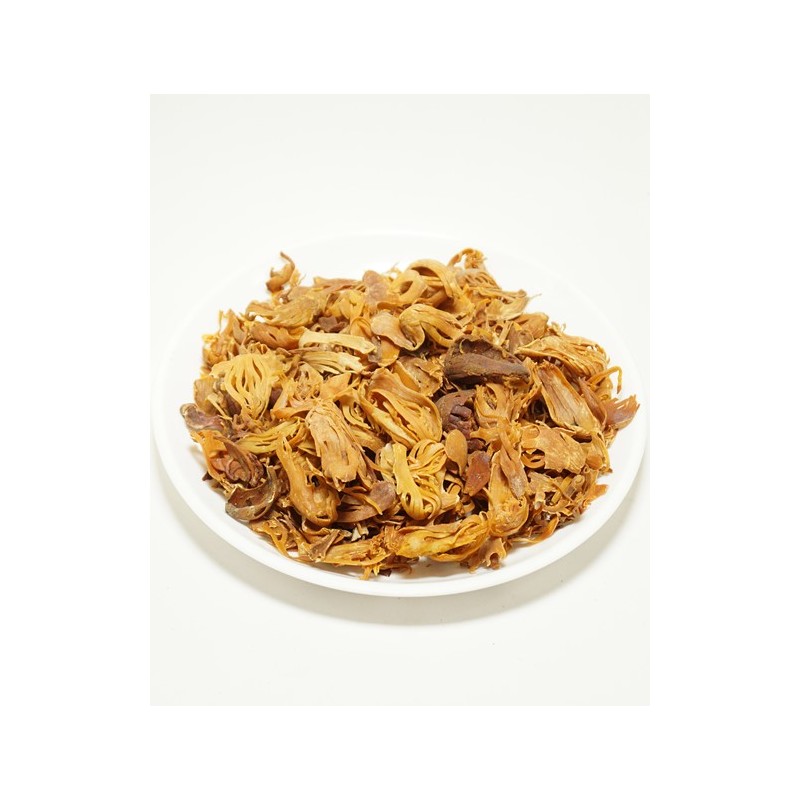
Javitri – जावित्री – Mace – Myristica fragrans
₹260.00 – ₹3,360.00Quick ViewIn Ayurvedic medicine, mace (also known as “Javitri”) is used for its various health benefits. Here are some of the potential benefits of mace:
- Supports digestive health: Mace is believed to have a positive effect on the digestive system and may help promote healthy digestion.
- May have anti-inflammatory effects: Some studies have found that mace has anti-inflammatory properties and may help reduce inflammation in the body.
- Supports healthy skin: Mace is used in various Ayurvedic skin care products due to its ability to promote healthy skin.
- Supports respiratory health: It is believed to have a positive effect on the respiratory system and may help support respiratory health.
- Supports the nervous system: Mace is believed to have a positive effect on the nervous system and may help support nerve function.
- May have antifungal properties: Some studies have found that mace has antifungal properties and may help prevent the growth of fungi.
- Hindi: Javitri
- Bengali: Jaiphal
- Marathi: Jayaphal
- Tamil: Japathri
- Telugu: Japathri
- Kannada: Japatri
- Malayalam: Jathipathri
- Persian: Jafari
- Sanskrit: Jatiphala
-
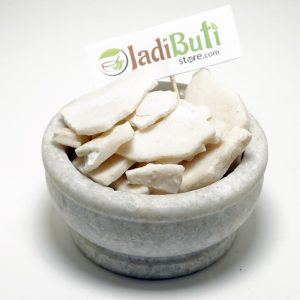
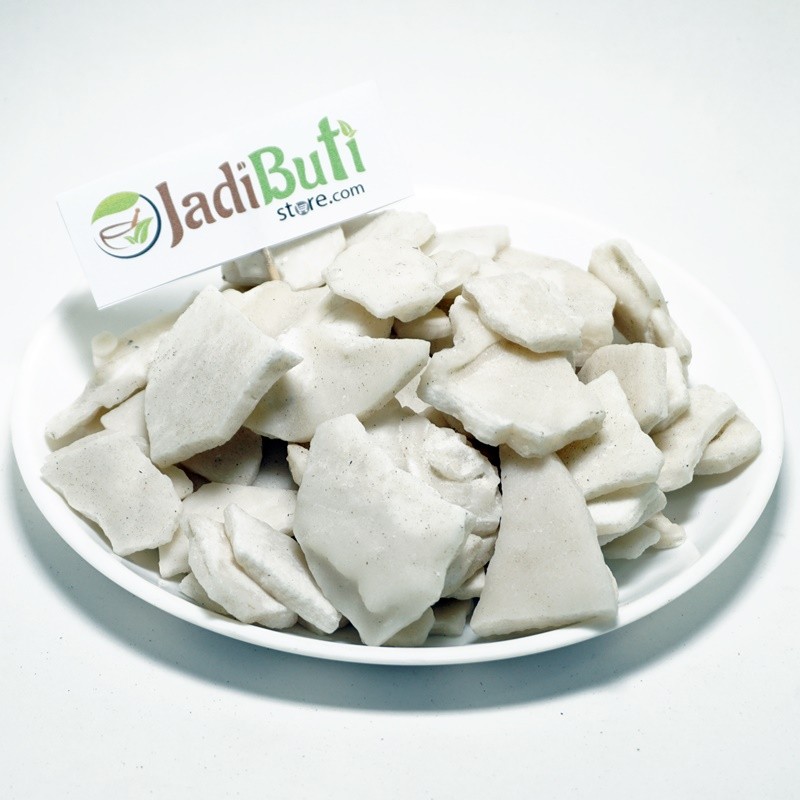
Jawakhar – जवाखार – Potassium Carbonate
₹110.00 – ₹680.00Quick ViewJawakhar – जवाखार – Potassium Carbonate – Yawakshar
Jawakhar in Hindi name – Jawakhar
Jawakhar in Latin name – Potassium Carbonate
Properties:
Jewel fertilizer relaxes swelling and cough,keeps urination and removes squats
Useful in various diseases :
1. Malaria fever : Grind 3 grams of jawakhar, powder of Peep and grind 3 grams by mixing it in jawakhar and making small amounts of equal size tablets. Take one tablet with hot water in the morning and evening.
2. Kidney Disease:
- Combine both garlic and sugar in 2-2 grams. By grinding it with water, the stone breaks down and breaks down with urination. This mixture is relaxed every morning and evening.
- Mix 5 grams of jackfruit in 250 ml of cow’s milk and drink it morning and evening and kidney stone is finished
3. Liver disease: Consumption of jawakhar with whey provides relief from liver disease.
4. Disease of mouth: Add jamkhar, five salt and honey and apply it on tongue, lips and throat bark. With this all the diseases of the mouth are cured.
-
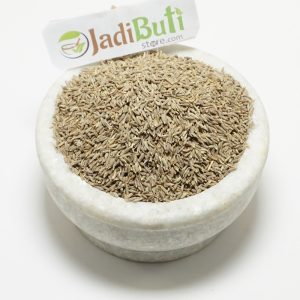

Jeera Safed- सफ़ेद जीरा – Cumin Seeds – Cuminum Cyminum
₹110.00 – ₹875.00Quick ViewJeera, also known as cumin seeds, is a small, elongated, and pale brown spice that is commonly used in cooking in various cuisines around the world, particularly in Indian, Middle Eastern, and Mexican cuisine. It has a warm, earthy, and slightly bitter flavor that adds depth and complexity to dishes. Jeera is a rich source of antioxidants, vitamins, and minerals and has several health benefits, as mentioned Below. Jeera can be used as a whole spice or ground into a powder and can be added to a wide range of dishes, including soups, stews, curries, rice dishes, and salads. It is a versatile spice that can be used to enhance the flavor and nutritional value of many different types of food.
-
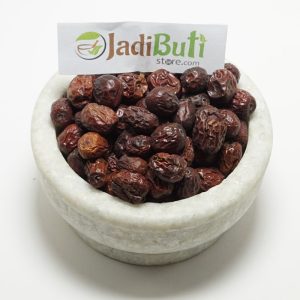
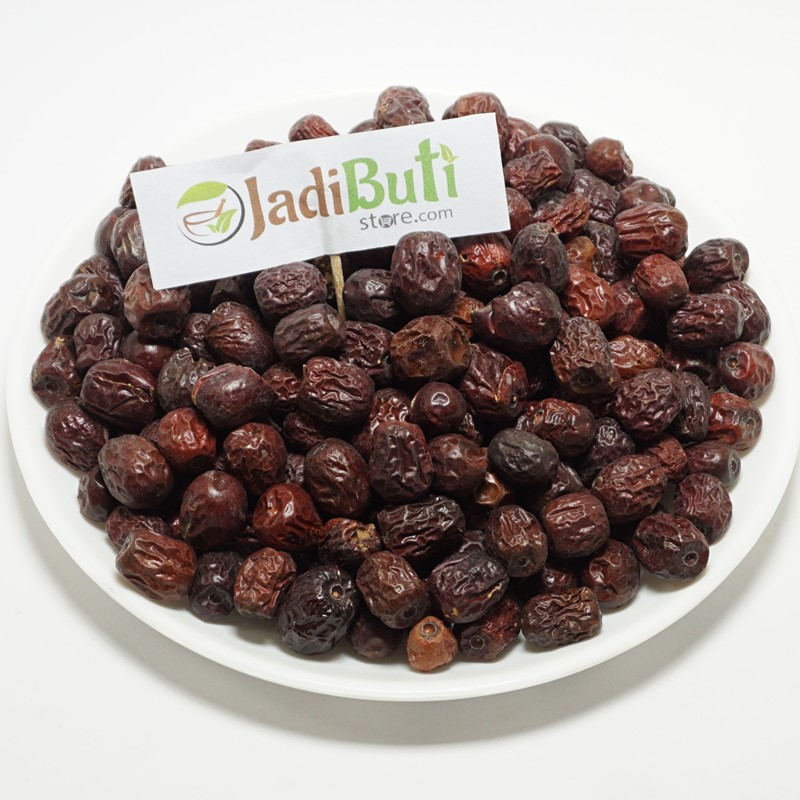
Unnab ber – उन्नाब बेर – Jujube Fruit – Ziziphus jujuba
₹120.00 – ₹955.00Quick ViewJujube (Unnab in Ayurveda), Scientific Name: Ziziphus jujuba. Family: Rhamnaceae
Native Region: Jujube is native to China, but is now widely cultivated throughout the world, including in India, the Middle East, and North America.
Parts Used: Fruit, seeds, leaves, bark (This is Fruit)
Ayurvedic Properties:
- Rasa (taste): Sweet, sour
- Guna (quality): Light, dry
- Virya (potency): Cooling
- Vipaka (post-digestive effect): Sweet
- Doshas: Pacifies Vata and Pitta doshas
Ayurvedic Uses:
- Improves digestion
- Boosts immunity
- Helps manage stress and anxiety
- Supports heart health
- Promotes skin health
- Helps regulate blood sugar levels
- Improves bone health
- Provides relief from respiratory problems
- Promotes healthy hair
- Supports liver health
- Provides relief from menstrual cramps
- Helps to reduce inflammation


